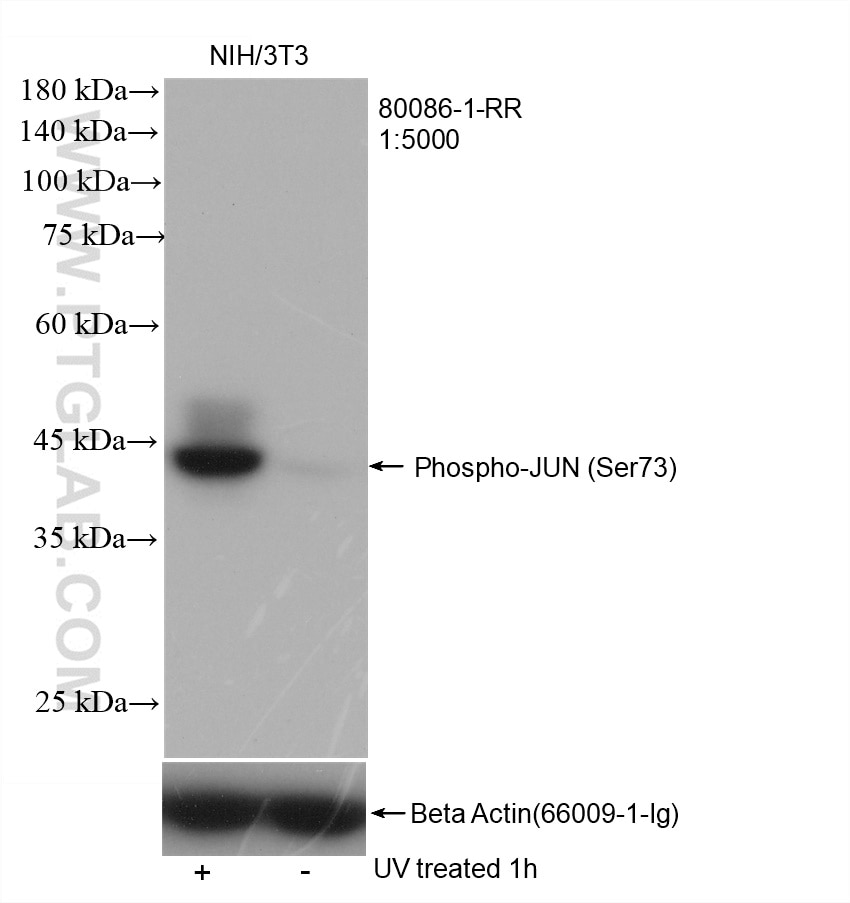Phospho-JUN (Ser73) Recombinant antibody
Phospho-JUN (Ser73) Recombinant Antibody for WB, ELISA
Host / Isotype
Rabbit / IgG
Reactivity
Human, mouse
Applications
WB, ELISA
Conjugate
Unconjugated
CloneNo.
4A18
Cat no : 80086-1-RR
Synonyms
Validation Data Gallery
Tested Applications
| Positive WB detected in | UV treated NIH/3T3 cells |
Recommended dilution
| Application | Dilution |
|---|---|
| Western Blot (WB) | WB : 1:2000-1:10000 |
| It is recommended that this reagent should be titrated in each testing system to obtain optimal results. | |
| Sample-dependent, Check data in validation data gallery. | |
Product Information
80086-1-RR targets Phospho-JUN (Ser73) in WB, ELISA applications and shows reactivity with Human, mouse samples.
| Tested Reactivity | Human, mouse |
| Host / Isotype | Rabbit / IgG |
| Class | Recombinant |
| Type | Antibody |
| Immunogen | Peptide |
| Full Name | jun oncogene |
| Calculated Molecular Weight | 331 aa, 36 kDa |
| Observed Molecular Weight | 42-45 kDa |
| GenBank Accession Number | BC068522 |
| Gene Symbol | JUN |
| Gene ID (NCBI) | 3725 |
| Conjugate | Unconjugated |
| Form | Liquid |
| Purification Method | Protein A purification |
| Storage Buffer | PBS with 0.02% sodium azide and 50% glycerol pH 7.3. |
| Storage Conditions | Store at -20°C. Stable for one year after shipment. Aliquoting is unnecessary for -20oC storage. 20ul sizes contain 0.1% BSA. |
Background Information
JUN, the most extensively studied protein of the activator protein-1 (AP-1) complex, is involved in numerous cell activities, such as proliferation, apoptosis, survival, tumorigenesis and tissue morphogenesis (PMID: 22180088). JUN is a transcription factor that recognizes and binds to the enhancer heptamer motif 5'-TGA[CG]TCA-3'. It promotes activity of NR5A1 when phosphorylated by HIPK3 leading to increased steroidogenic gene expression upon cAMP signaling pathway stimulation. JUN is a basic leucine zipper (bZIP) transcription factor that acts as homo- or heterodimer, binding to DNA and regulating gene transcription (PMID: 9732876). In additon, extracellular signals can induce post-translational modifications of JUN, resulting in altered transcriptional activity and target gene expression (PMID:8464713). More over, it has uncovered multiple layers of a complex regulatory scheme in which JUN is able to crosstalk, amplify and integrate different signals for tissue development and disease. Jun is predominantly nuclear, ubiquitinated Jun colocalizes with lysosomal proteins (PMID: 15469925).
Protocols
| Product Specific Protocols | |
|---|---|
| WB protocol for Phospho-JUN (Ser73) antibody 80086-1-RR | Download protocol |
| Standard Protocols | |
|---|---|
| Click here to view our Standard Protocols |


